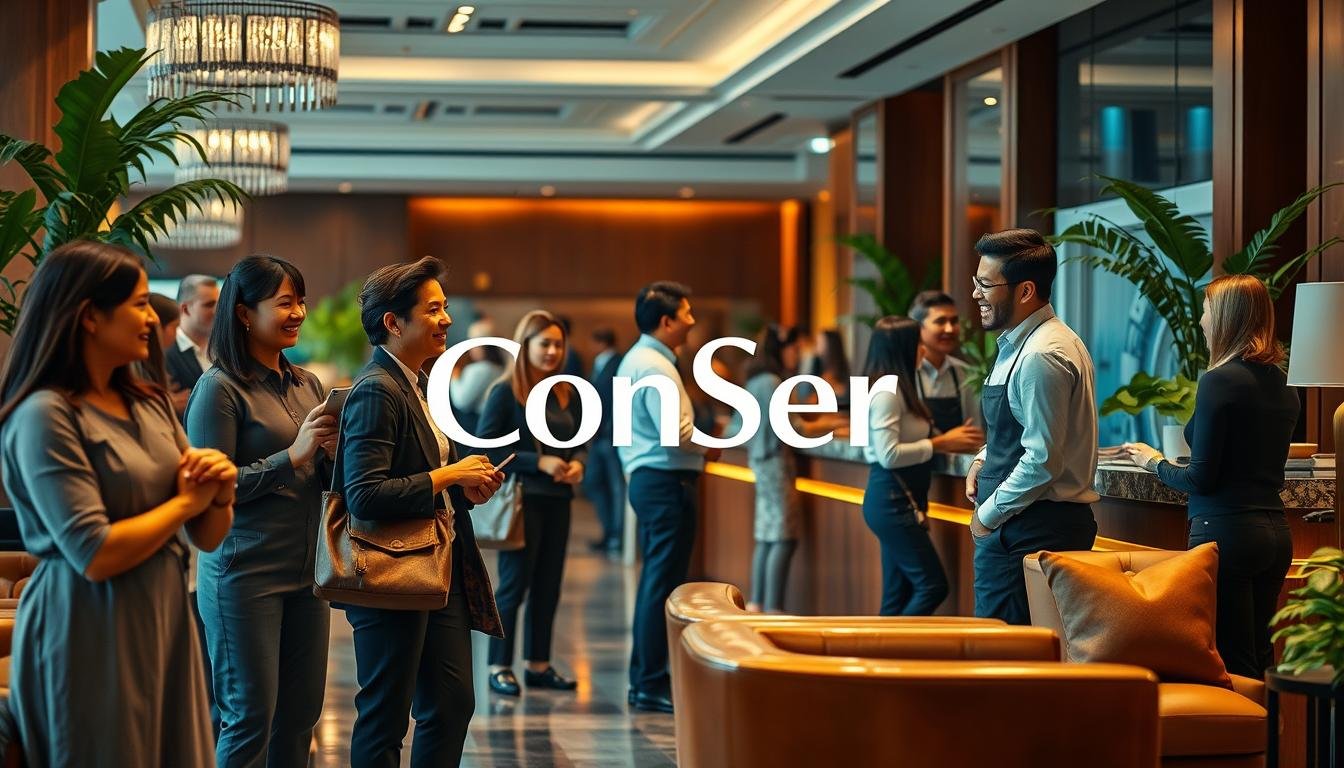HOME / SINGLE POST

Did you know that over 90% of guests feel more satisfied and loyal when hotel staff listens actively1? This fact shows how key communication is in the hospitality world. It’s vital for making guests happy and for running things smoothly in hotels, restaurants, and other places where people go for fun or business.
From the moment guests arrive to the behind-the-scenes work, clear and caring communication is key. It helps staff understand what guests need, build strong connections, and keep things running smoothly. Even with more digital ways to connect, the personal touch in talking to guests is more important than ever. It makes sure guests have the best time possible.
Also, 85% of guests like it when staff show they care by being empathetic1. It’s not just what is said that matters, but how it’s said. In a world where guests have different needs, talking well is key. It helps make everyone feel welcome, understood, and clear about what’s going on2.
Good communication does more than just make guests happy. It’s also important for talking with staff, boosting their spirits, and solving problems3. It helps create a positive place to work and makes the service better overall.
Communication is key in the hospitality industry. It helps create unforgettable guest experiences and a positive work environment. Let’s explore the main parts of communication in this exciting field.
Effective communication in hospitality means clear, timely, and caring talks between staff and guests. It’s about sharing info well and meeting needs quickly. Research shows that 42% of customers trust friends and family more than ads, showing how good communication leads to positive word-of-mouth4.
Verbal communication includes what we say and how we say it. Nonverbal cues are our body language, facial expressions, and gestures. Both are key in how we connect with guests. Listening well is important to make sure staff understand and help guests’ needs.
Today, communicating across cultures is a must in the hospitality world. Hotels that offer languages and train staff to be culturally aware create welcoming spaces. This is vital, as unhappy guests often tell 9 to 15 others about their bad experience4.
| Communication Aspect | Impact on Guest Satisfaction | Implementation Rate |
|---|---|---|
| Clear Information Channels | High | 75% |
| Multilingual Support | Medium | 60% |
| Staff Training in Communication Skills | Very High | 85% |
By focusing on good communication, hotels can make guests happier and keep them coming back. Remember, 91% of unhappy customers won’t return, showing how important communication is in keeping guests4.
Effective communication is key in the hospitality industry. It makes sure information flows well, making guests happy and teams work better.
Formal and informal communication are both important. Formal talks are for work stuff, while informal chats build trust and a good work culture. Both kinds of communication help things run smoothly.
Horizontal communication is between people at the same level. It helps teams work together and talk openly. Vertical communication sends info up and down the company ranks. This mix is key for solving problems and giving feedback.
Written and visual communication matter a lot too. Emails, texts, and sheets give clear instructions. Pictures, graphs, and videos make complex ideas easy to understand. Knowing how to use these helps create a strong communication system in hotels and restaurants.
Training programs teach these important communication skills. They show how clear messages and flexible communication can make guests happier. If guests are unhappy, they might not come back, showing how crucial good communication is for keeping customers5.
Technology has changed how we communicate in hospitality. Tools and systems make work more efficient, letting staff give better service and answer guest needs fast6. Mixing tech with traditional ways of talking is key in today’s hospitality.
“Heart-centered leadership was identified as an effective approach in improving communication within the hospitality industry, focusing on empathy and understanding in leadership practices.”7
By using these important parts and new tech, hospitality businesses can make a communication system that boosts guest satisfaction and team performance. This not only makes things run better but also helps in the long run in a tough market.
Effective communication is key to success in the hospitality industry. It shapes how guests feel, how staff perform, and how the business grows. Let’s look at the main benefits of getting this skill right.
Good communication skills are a must in hotels, restaurants, and other service jobs. When staff know how to talk to customers, they can meet their needs better. This leads to happier guests who spend more and come back89.
Good communication makes a team work together better. It helps hotels run smoothly and serve guests well. Training staff in communication can make teams work more together and efficiently9.

Clear talk helps prevent mix-ups that could mess up operations. Training staff on different cultures and values is key. It stops making assumptions and encourages listening, cutting down on conflicts89.
Good communication in hospitality means better money matters, like lower costs and more hotel revenue. It makes guests feel valued and improves their stay. By focusing on excellent customer service and training staff, businesses can draw in more guests and grow sustainably.
Good communication skills are key in the hospitality industry, just as important as technical skills10. They make guests happy, improve how staff work together, and help solve problems10.
Active listening means asking follow-up questions, rephrasing, and making sure you understand10. This skill helps managers get what guests and staff need. By listening well, hospitality pros can make guests and teams work better together.
In hospitality, clear communication is a must, especially when talking directly with clients10. Managers should work on how they speak, choosing words, speaking loud enough, and using the right tone10. Writing things like emails and reports also needs to be clear and respectful10.

Feeling what others feel and understanding emotions are important for connecting with guests and solving problems. Guests now look for emotional experiences, so managers should aim to give them11.
Changing how you talk is key when you meet different guests and team members. Knowing how to communicate with people from various cultures is a must10. Managers should also think about how different brains process information, which affects how people communicate10.
| Communication Component | Percentage |
|---|---|
| Body Language | 55% |
| Tone and Inflection | 38% |
| Verbal Content | 7% |
This table shows how important nonverbal communication is in hospitality12. Managers should work on understanding different cultures, give good feedback, and use technology to improve communication in all ways.
Effective communication is key in the hospitality industry. It makes for great guest experiences and top-notch operations. When people talk clearly and kindly, guests trust and like them more. This leads to happy guests who come back and tell others about it13.
This way of talking isn’t just for guests. It also helps with working together inside the hotel or restaurant. It stops mistakes from happening13.
Having a strong team needs open talks. This helps with working together, sharing ideas, and solving problems. Happy employees stay longer and give better service13. Hotels can help by training staff in how to talk better and using digital tools for sharing info14.
Today’s hotels need to understand different cultures. Good communicators make everyone feel welcome and important13. Hotels should listen to what staff and guests say. This helps find ways to get better and build a team spirit14.
This makes guests happier and helps keep staff from leaving. It also makes the whole hotel work better.
Never miss any important news. Subscribe to our newsletter.